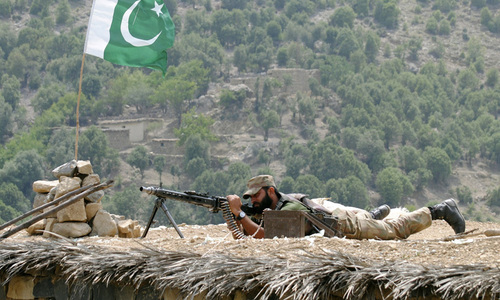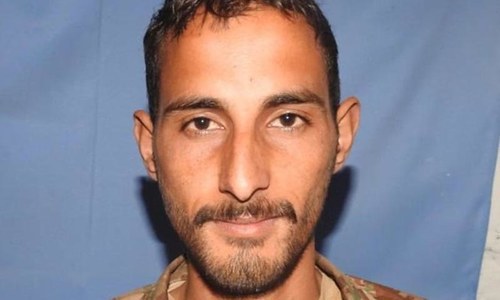MUZAFFARABAD: A seven-year-old boy who was hit by an Indian sniper from across the restive Line of Control (LoC) on Sunday night succumbed to his wounds early on Monday, pushing the civilian death toll in the Indian firing over the last 24 hours to three, officials and residents said.

Mohammad Saddam was standing at the entrance of his house in Taroti village of Abbaspur sector in Poonch district at about 8.45pm when the Indian sniper struck him with a single bullet, said Syed Tassawar Hussain Kazmi, Assistant Commissioner of Abbaspur.
The LoC is at a stone’s throw from the victim’s house, he said.
Saddam’s death once again brought into the spotlight the cowardly practice which Indian troops have added to their methods of ceasefire violations across the LoC.
According to AJK officials, apart from resorting to heavy shelling, Indian troops often snipe with high calibre weapons and target innocent men, women and children as the latter carry out daily chores in or outside their homes along the LoC.
Scores of AJK civilians have lost their lives in such targeted firings, Saddam being the latest victim.
Indian deputy high commissioner summoned by FO to lodge protest
Talking to Dawn, Saira Yousuf Chughtai, an Abbaspur-based journalist, regretted that despite being an Indian shelling- affected area, Abbaspur lacked a proper healthcare facility where trauma patients could be provided better treatment.
“Sadly, our local facility is just for the dressing, bandages which have to be purchased by victims themselves from private pharmacies,” she alleged.
“... and as they are instantly referred to [SKZN Hospital] Rawalakot, those with serious injuries mostly die during the arduous journey,” she said.
In 2017, the youth of the area launched a peaceful movement for rehabilitation of a purpose-built building of Tehsil Headquarters (THQ) Hospital in Abbaspur, which was affected by the 2005 earthquake.
In order to pacify the youth, the government issued a notification for construction of the THQ Hospital building in accordance with the public demand. The work order for the building was issued at the end of the same year to the brother of the ruling PML-N MLA from the area, but it has not been accomplished as yet.
The residents of Abbaspur launched another campaign for upgrade of the Rural Health Centre (RHC) as the THQ Hospital after completion of the building, but to no avail.
Assistant Commissioner Kazmi admitted that even the RHC, currently functioning in a shelter type structure, was understaffed, with only two female medical officers on its roll.
“We have buried so many of our loved ones due to the absence of proper healthcare facilities, but enough is enough. We cannot bury more bodies,” said Khawaja Sohail Asghar, chief patron of a social group of Abbaspurians.
Settled in the US, Asghar spoke to Dawn from Abbaspur where he had arrived early this month to celebrate Eidul Azha with his family.
“If rulers can spare funds for their foreign tours, they should also spare funds for such essential services for a population they often describe as the first line of defence,” he said.
At the funeral prayers for Saddam, offered by hundreds of people in the playground of Abbaspur Boys Degree College, a group of younsgters arrived in a rally.
While they raised slogans against India for shelling and killing the unarmed civilian populations, there were also chants against the AJK government for its failure to upgrade healthcare services as per demands of the situation.
Indian envoy summoned
The Foreign Office on Monday summoned Indian Deputy High Commissioner Guarav Ahluwalia at the Ministry of Foreign Affairs in Islamabad and condemned the unprovoked ceasefire violations by Indian-occupation forces along the Line of Control, adds APP.
The Foreign Office’s South Asia and Saarc Director General, Dr Mohammad Faisal, told the Indian envoy that India must respect the 2003 ceasefire arrangement, investigate incidents of ceasefire violations, instruct Indian forces to respect the ceasefire in letter and spirit and maintain peace along the LoC and the Working Boundary.
On Sunday, in Hot Spring and Chirikot sectors of the LoC, two elderly civilians Lal Mohammad, 75, and Hassan Din, 61, residents of village Nagrai, were martyred.
Dr Faisal stressed that India should permit UNMOGIP (United Nations Military Observer Group in India and Pakistan) to play its mandated role as per the UN Security Council resolutions.
Published in Dawn, August 20th, 2019














































